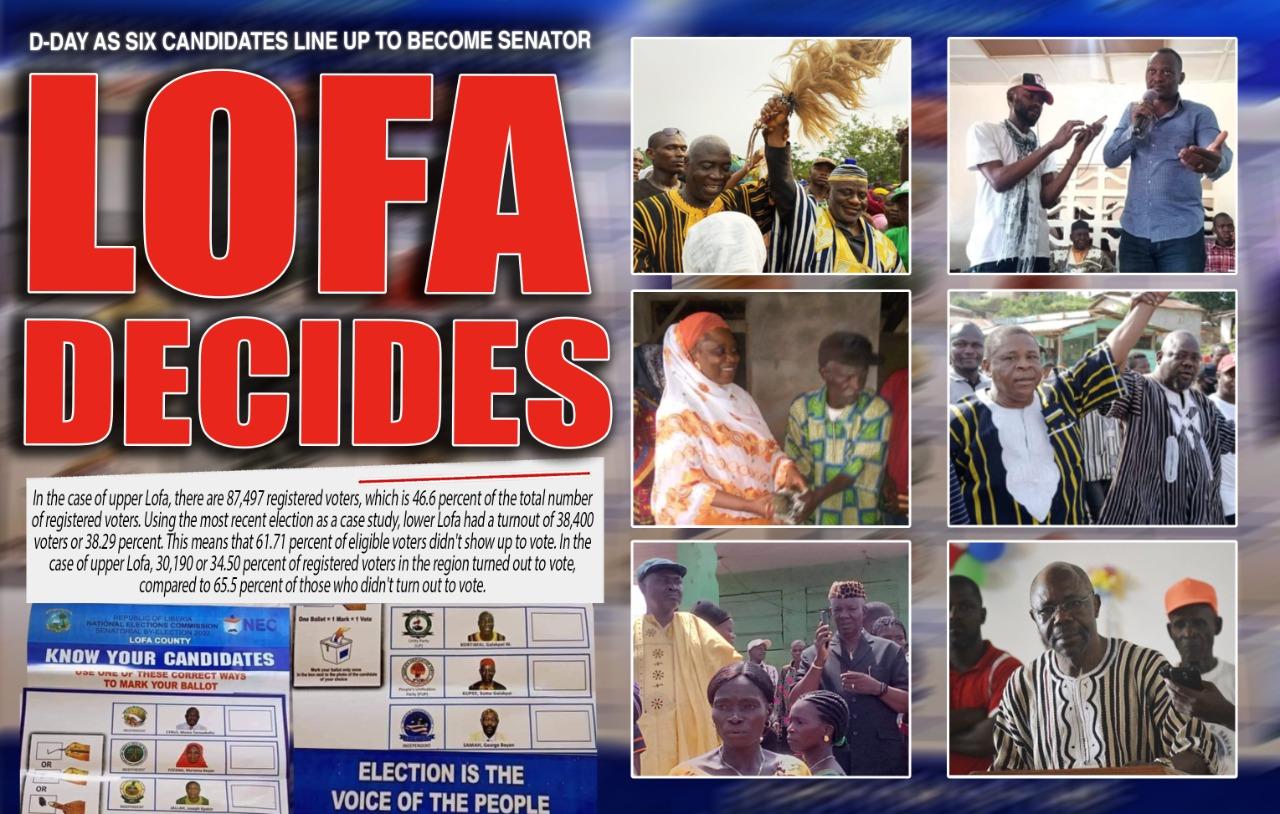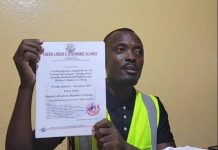Africa-Press – Liberia. Six candidates are vying to fill the vacant senatorial seat of Lofa County as contained on the National Elections Commission (NEC) list.
They are Garlakpai Kortimai of Unity Party (UP), Sumo Kupee of the People’s Unification Party (PUP), Cllr. Joseph Jallah (Independent), Momo Cyrus (Independent), Beyan Samah, Independent, and Mariamu Fofana (Independent).
The events of the last two weeks have shown that the senatorial election holding is a three-horse race between Kortimai, Jallah, and Cyrus.
The seat was declared vacant by the Liberian Senate after Brownie Samukai of UP, who won the December 2020 Special Senatorial elections, was denied from taking his seat by the Supreme Court of Liberia for misappropriation of the Armed Forces of Liberia personnel funds.
Only one candidate would triumph at the end of the poll which has a total of 187,775 registered voters, according to the 2020 statistics of the NEC, with the lower part of the county accounting for 100,278 registered voters or 53.40 percent of the total number of registered voters.
In the case of upper Lofa, there are 87,497 registered voters, which is 46.6 percent of the total number of registered voters.
Using the most recent election as a case study, lower Lofa had a turnout of 38,400 voters or 38.29 percent. This means that 61.71 percent of eligible voters didn’t show up to vote.
In the case of upper Lofa, 30,190 or 34.50 percent of registered voters in the region turned out to vote, compared to 65.5 percent of those who didn’t turn out to vote.
Boakai’s political future
Today’s poll is going to be keenly contested as it could decide the political future and relevance of the standard-bearer of UP and former Vice President Joseph Boakai not only being held in his homestead Lofa, but also in the political equation of the country ahead of the 2023 presidential elections.
It is an election many analysts are convinced that the power of nativity may count in favor of Boakai, due to the overwhelming support he has received from Lofa County since 2005 when he contested alongside former president Ellen Johnson-Sirleaf.
Boakai’s political survival, according to observers of unfolding events in the country, will be dependent on the success of the UP candidate heading into 2023.
FrontPageAfrica’s analysis suggests that the outcome of today’s by-election would be influenced by a number of factors, including party structures, religion, voter turnout, and geo-political balance.
In this analysis, FrontPageAfrica’s Selma Lomax weighs in on the strengths and weaknesses of the six candidates vying to become Senator and where the votes would probably be won.
MARIAMU B. FOFANA:
THE UPSIDE:
No doubt, the District Four lawmaker is a Lofa political icon whose strength can’t be underestimated, as seen by her previous political experience in the county, dating as far back as 2011, when she first introduced herself to the county politics.
She ran for representative of District Four for the first time in 2011, winning with 4,631 votes out of 20,345 valid votes cast among fourteen contenders in the race.
In 2017, she was re-elected with 8,438 votes out of 28,856 cast with 11 contenders running. During the 2020 senatorial elections, she ran and finished third with 9,629 votes out of 64,252 valid votes from of a race predominantly 11 male candidates. She received 4,448 votes from District Four and 1,295 votes from District Five, giving her a total of 5,743 votes from upper Lofa and 2,695 votes from lower Lofa. She is a possible candidate from upper Lofa to keep an eye on.
THE DOWNSIDE:
Many of her critics feel she is a tribalist who is causing consternation even among her kinsmen, including her former Chief-of-Office Staff, Musa Kolleh. Many believe her purported statement that “if palm wine is not finished in the bush, no Lorma man will be elected” continues to work against her in terms of Lorma ethnic votes. However, she has denied making such a statement and challenged her accusers to provide evidence, which no one has done.
The lawmaker’s long-standing feud with Sekou Kolleh, an influential young man of District Four, and other potential Quadu Gboni natives would almost certainly impact her senatorial bid and may even jeopardize her victory as Senator in Tuesday’s poll.
Mariamu has a stable base of support within her tribal and inter-personal groupings but hasn’t done much to diversify that foundation. With the arrival of Kupee, Kortimai, Cyrus, and Samah, it is possible that her voting population and numbers might decrease in the pending election, particularly in upper Lofa.
MOMO CYRUS:
THE UPSIDE:
Many influential young people, particularly in upper Lofa’s Voinjama Administrative District, regard Cyrus as a beacon of hope, a new power dynamic in the county’s body politics.
As a fervent promoter of youth development and sports, Cyrus is credited with leading the County to its first two trophies (football and kickball) since the foundation of Lofa in 1964 and the beginning of the National County Sports Meet in Liberia.
He has worked for the county, primarily in the Voinjama District, where he is from. Despite having no political records in the county, he has remained involved in conflict resolution, the most recent being a standoff at the Lofa County Community College between disgruntled faculty members and the administration, during which a resolution was signed and later overturned by the Lofa County Community College Board of Trustees.
He is a business-minded young man who founded one of the largest private security organizations, SEGAL, which employs many Liberians, including Lofians.
THE UPSIDE:
Many of his critics feel that his decision to run is a ploy to keep Senator Stephen Zargo from running in 2023, further eroding Zargo’s popularity. He is a newcomer to Lofa politics, with many believing that because of his proximity to Monrovia City Mayor Jefferson Koijee, he is also one of two proxy candidates of the (CDC), and that his participation would see the Coalition gain more ground in the Voinjama District than in previous elections.
Despite the fact that this claim could not be independently proven, it could have an impact on his candidacy.
OPPORTUNITIES IN THE BY-ELECTION:
Cyrus, from the Lorma ethnic group, may only have a 30 per cent chance of being elected senator and a 70 per cent probability of not being elected if the existing variables play out against him. This could be owing to his first appearance in Lofa politics, and while he is a famous name, his critics feel he is a newcomer to the Lofa political theater and has no past political records to be trusted with the top post.
With fewer voters registered in upper Lofa, as well as the voting pattern and the fact that the current senator, Stephen Zargo, comes from Voinjama District, Cyrus appears to be in a difficult position to win. This could be a political experiment for him.
GALAKPAI KORTIMAI:
THE UPSIDE:
As superintendent of Lofa from 2006 until late 2012 July, Kortimai was a strong supporter of the county’s growth and provided opportunities for many of his kinsmen, notably young people.
He was instrumental in guaranteeing the UP’s two presidential elections in 2005 and 2011 through his leadership of the party.
Kortimai is, on the whole, selfless and easy to get along with. He is a local entrepreneur that owns a peanut butter processing plant in the county, which employs a large number of people.
He has a long background in Lofa politics and ran against former senator Kupee from the same Zorzor District in the 2014 senatorial elections. He finished sixth with 3,570 votes out of a total of 48,812 valid votes.
From the Gizzima Clan, Zorzor District, he has amassed considerable administrative authority and earned the trust of his kinsmen in the inhabited towns of Fissebu and Yeala, as well as some areas of Zorzor City.
Kortimai has established positive long-term working relationships throughout the county, especially Voinjama, where he has a sizable network of supporters among the Lorma-speaking community.
Many of Samukai’s followers regard him as a true fighter who stayed by them throughout Samukai’s court trial and believe that they may compensate him by choosing him to replace Samukai.
THE DOWNSIDE:
Kortimai has done little to maintain his political base, as seen by his political grass-roots hopping from the UP in 2005-2012 to the Congress for Democratic Change in 2014, before returning to the UP in 2022 and currently acting as County chairman of UP.
Kortimai’s long-standing enmity with Kupee may have a detrimental effect on his election prospects. He has had little impact in Salayea District since 2012 and may lose a sizable portion of the Salayea vote.
With the current trajectory of events, he may garner a majority of votes from the Samukai Camp, but this might not be enough to overcome the Districts One and Three vote in total.
With three candidates from Zorzor District, namely: Kortimai (Gizzimai Clan), Kupee (Gizzimai Clan), and Samah (Zeayama), Kortimai’s chances seem bleak as Zorzor District votes might be chosen by the Bluyeama Clan, over which Kortimai has little power.
OPPORTUNITIES IN THE BY-ELECTION:
Even with the Friends of Samukai’s blessings, Kortimai might struggle to maintain a commanding lead given that Samukai’s major supporters were in Districts One , Four and Five, while Jallah won districts Two and Three in the midterm election. Kortimai’s task would be to work extensively to ensure that the votes in these districts are from Samukai supporters. This appears to be unlikely given that Mariamu, who finished second to Samukai in District Four, is also back in the race, and the return of Cyrus could further dent his chances.
Kortimai may also struggle in District Five due to the presence of Kupee and Samah. Kortimai will have a 25 per cent probability of getting elected and a 75 percent chance of not being elected if all of these things remain constant.
JOSEPH K. JALLAH:
THE UPSIDE:
Jallah is a significant political challenger in Lofa’s body politics, as evidenced by his consistency in finishing second in two successive elections (2014 and 2020) and third in 2011.
Since 2011, he has maintained political consistency in terms of vote totals. For example, when he ran in 2011, he finished fourth with 12,420 votes out of 91,402 legitimate votes cast with the participation of ten candidates.
Jallah finished second to Senator Stephen Zargo in 2014, with 8,570 votes out of 48,812 total valid votes cast, with the involvement of 9 candidates, including Kupee and Kortimai, who finished fourth and sixth respectively. In 2020, Jallah finished second to Samukai with 13,968 votes out of 64,252 valid votes cast with 11 candidates competing.
There is a little doubt that Jallah retains the trust of his kinsmen, particularly those from the Gbandi chiefdom and, by extension, the lower Lofa region, who views him as a true representative of them. Clearly, in all of these elections in which Jallah has taken part, he has had a considerable amount of support from the lower Lofa as opposed to the upper Lofa.
In 2011, he finished second behind former Senator George Tengbeh in District One with a vote of 1,403, third to Tengbeh in District Two with a vote of 1,975, and first in District Three with a vote of 5,508.
In 2011, Jallah received 8,886 votes, representing 71.54 percent of his 12,420 votes, with the remaining 28.46 percent coming from upper Lofa. Similarly, in the 2020 midterm senatorial election, he received 11,157 votes from lower Lofa, accounting for 79% of his total votes cast.
Interestingly, with the exception of District One, where he finished fourth, he finished first in Districts Two and Three, with higher vote totals than in previous years.
Due to the lack of many possible candidates in the lower District, these figures are expected to rise in the by-election, putting Jallah in a far more comfortable position in Lower Lofa.
THE DOWNSIDE:
Many of his critics blame his three defeats on his “complacency and arrogance”.
What would have a detrimental impact on his votes is his alleged involvement in the Samukai’s trial, which he has since denied and challenged his accusers to prove. This may, to some extent, make it difficult for him to obtain the Friends of Samukai’s support.
If he does not diversify his support base in other regions, he may lose the backing of other districts, which could jeopardize his ambition.
OPPORTUNITIES IN THE BY-ELECTION:
With all of these stated elements plus the fact that Jallah doesn’t have a big challenger in lower Lofa, he may have a 60 percent probability of being elected as opposed to 40 per cent if all of the existing variables persist in upper Lofa, where there are five probable contenders.
SUMO G. KUPEE:
THE UPSIDE:
Kupee is an economist and former Lofa County Senator from 2006-2014. He was a Chairman of the Senate Ways and Means Committee and now the Ways and Means Finance and Development Planning Committee.
He is credited with ensuring the allocation of funding for several institutions, including some community radio stations, hospitals, and public institutions, by working with Moses Y. Kollie, former chairman of the Houses’ committee on Ways Means and Finance, and other members of the Lofa Legislative Caucus.
Even though Kupee didn’t do these alone, he has taken credit for them, and many of his supporters see this as a crucial message to get him elected.
Following his defeat in 2014, he was appointed Managing Director of the Liberia Petroleum Refinery Company (LPRC), a position he relinquished in 2017 to accept the job of Board Chairman of the National Port Authority (NPA).
THE DOWNSIDE:
Many of his critics feel he is an arrogant man with a conceited desire to be worshiped by others. This had a significant impact on his re-election campaign in 2014, when he finished fourth behind Sen. Zargo with 6,288 votes out of 48,812 valid votes cast and nine contenders.
Kupee’s failure to keep his Senate seat made him very unpopular in the eyes of many Lofians, as many saw his defeat as a clear indication that he was not the best choice to represent Lofa at the National Legislature.
The allegation of his alleged ritualistic killing of little Vawu Kesselee in Zorzor District, which has yet to receive a court ruling or charge against Kupee, continues to affect his political ambition in Zorzor District, primarily around the Zeayama Clan, could still affect his return to the senate even in this by-election.
GEORGE BEYAN SAMAH: THE UPSIDE:
Samah, like Cyrus, is fresh to Lofa politics, serving as representative of Montserrado County District Number 12. With little recognition in Lofa County, Samah claims to have helped the health care system by contributing over $80,000 in medical supplies, fuel, and pharmaceuticals to the Curran Lutheran Hospital, the Voinjama Telewoyan Hospital, and the Kolahun Hospital.
THE DOWNSIDE:
Many of his critics believe he is a political scammer based on his style of cash politics, and his participation in the by-election is a minus for Kupee and Kortimai and eventually, the three of them would have fewer chances of being elected to the position of Senate.
OPPORTUNITIES IN THE BY-ELECTION:
He is poised to gain the support of his Zeayama Clan in Zorzor District. Given the presence of Kupee and Kortimai, as well as the present political trend in the County, Samah’s odds of being elected are 10 percent, while his chances of not being elected are 85 percent.
For More News And Analysis About Liberia Follow Africa-Press






